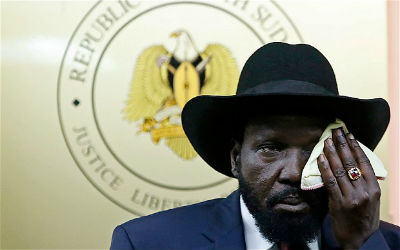![“South Sudan's President Salva Kiir wipes his face during a news conference in Juba, in which he said he was ready for dialogue with his rival” [Photo: GORAN TOMASEVIC/Reuters].](http://www.southsudannewsagency.com/wp-content/uploads/2013/12/aaaa-Kiir-%20aa%20Reuters.jpg) By “Papa” Maury Clark
By “Papa” Maury Clark
December 21, 2013 (SSNA) — The conflagration in South Sudan has lost any relationship to the cause of the conflict, if any such relationship ever existed. Centuries of petty inter-tribal warfare now drive the emotions on all sides. Any modern sense of proportion is destroyed by weapons that kill without the necessary personal contact of hand-held knives and thrown spears. Death may be immediate, but the combatants are less likely to be splashed by the blood of their victims as they fall.
No matter the cause, all action is direct and personal now without any consideration of a long-term result. When these circumstances prevail, nobody cares about the future, let alone an hour from now. Add to that the ironic blood fury of crowd psychology and any sense of proportion, right or wrong, ceases to exist. The bloodletting becomes the raison d’etre, and "To hell with the consequences!". I have seen good people caught up in this kind of fury who would stand immobilized in shock were this not to involve themselves personally. Bodies of dead civilians fallen in their streets and homes are NOT the basis for a strong foundation upon which to build a successful free nation.
The most probable result, barring international intercession, is killing to the point of exhaustion by both sides. That exhaustion then carries further risk. Third party intervenors may then step in to fill the vacuum that is left. If we are lucky, those new leaders may calm both sides, and allow common sense to reassert dominance. If the nation is not so lucky, the new leadership will exploit the surviving combatants, as well as what remains of the country to their own personal benefit. Josef Stalin and the Soviet Russian exploitation of East Germany, the Balkans and Crimea following World War two comes to mind.
The diaspora, and those few level heads remaining in South Sudan, must be prepared to assert a role in reaffirming the constitution, and the rule of law. Individuals who may be seen as partisan to one nation or another will likely doom themselves and South Sudan to failure. Reality probably dictates that peace-keepers need to arise from the smaller nations- the Bari, Shilluk, Anwak, or others not seen as favoring one tribal agenda over another. And it may take many such leaders in succession before the nation regains its footing. Most certainly successful new leadership will NOT evolve from the SPLM or anyone partisan to either the SPLM or its combative opposition. Neutrality brought on by necessity will likely be the genesis of any successor.
President Salva Kiir, you screwed up and this is the result. Whether accurate, or not, you appeared to favor your own Dinka over all of the other nations of South Sudan. You failed to quickly, and decisively prosecute corrupt appointees, thereby leading outside observers to believe that you, yourself, were also probably corrupt. That coin has two sides, and soon dominant rulership may fall to your Nuer opponents. Should that be the case, the nation must ask this question: Is new leadership dominantly comprised of the Nuer nation now in power because of the need to reassert the rule of law, or is it there simply because it is their turn to grab what it can? If the latter turns out to be the case, the Republic of South Sudan faces a bleak, repetitive future.
The very last thing the Republic needs is partisan support of either side. Those of you in the diaspora have all lived long enough in the free world to have witnessed successful democracies. We must STAND TOGETHER in support of the free Republic of South Sudan that was won by the blood of all of the individual nations of that country.
I, for one, am weary to the point of despair of losing family and close friends on both sides to blind hatred and greed.
Papa Maury Clark is a former advisor to the government of South Sudan, retired investment banker/broker, as well as a Called and Commissioned Deacon in the Evangelical Lutheran Church in America (ELCA), Northwest Washington Synod. He served under Bishops Appointment as pastor of Shepherd of the Valley Lutheran Church in Maple Valley, Washington in 1990 and 1991, and also served four years on the Synod Council and he has been deeply involved with the people of South Sudan since 1996.

